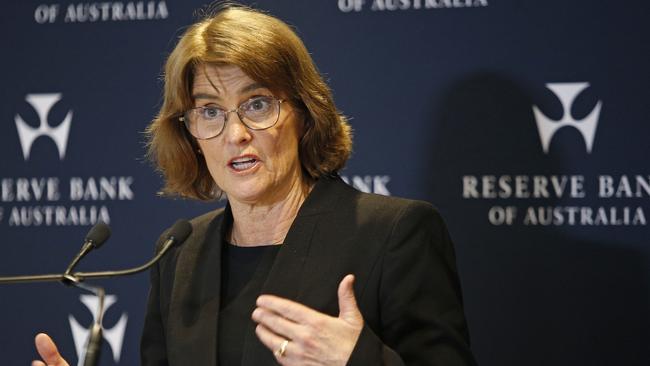Wages keep us on RBA path
Wages and productivity are the real pressures when it comes to which way the RBA breaks next.

There are two things that matter most to Reserve Bank governor Michele Bullock as her hand hovers over the interest rate lever.
And neither of them is federal government spending.
They are wages and productivity.
Whether we next get a rate cut, or a rate hike, and when, is – almost – all and only about what’s happening with them.
The numbers on Tuesday, for wage rises across the June quarter, were a mix of bad – or, more exactly, uncomfortable – and good news.
Simply put, the uncomfortable/bad news is that wages rising across the economy, whether private or public or combined, at or about 4 per cent, are utterly incompatible with getting inflation down to and keeping it around 2.5 per cent, the mid-point of the RBA’s 2-3 per cent target range.
That is, with our utterly abysmal productivity, made so stunningly worse by the almost full range of policies – hell, let’s call them by their real name, idiocies – coming out of Canberra.
The arithmetic is simple and iron-clad.
If wages are growing by 4 per cent, you can only get to 2.5 per cent inflation, if productivity is growing by 1.5 per cent.
Over the March year, productivity grew by exactly zero. Hence, and I have to say, this is put a little crudely, we had around 4 per cent inflation with the around 4 per cent wages growth.
The “good news”, though, were the signs of easing wages growth, especially in the private sector.
But only towards 3-3.5 per cent – and more, the 3.5 per cent when, you add the public sector.
But to me – and I would presume also, Bullock and her team – the really good news is the absence of any sign of wages growth kicking up to around the 4.5 per cent mark; or, obviously, much more threateningly, 5 per cent.
That’s the sort of thing that would point to the dreaded wages-prices spiral that would threaten to send inflation back into the high single digits.
And you know where Bullock’s hand would land, and more than once, on the rate lever if that happened, or threatened to happen.
Bullock would be able to claim off the wages data, that we – and her RBA – were still on, maybe clinging on to, the “narrow path”.
A path which had Bullock, at her post-meeting press conference last week, ruling out the chances of a rate cut through Christmas.
While not ruling out a rate hike. Both, broadly maintained after these numbers.
Now, I was of course deliberately overstating it to say the rate future was all and only about wages and productivity.
Indeed, I could very easily paint a very credible scenario where Bullock “did a 90”, so to speak, and delivered a cut at the September meeting, or, more likely, at the Cup Day meeting, after the next quarterly CPI.
And yes, government spending – both federal and state – goes into the RBA “rate assessment pot”.
But it’s not a second, or even third order issue, stopping a rate cut.
I’m guessing that Bullock will spell these sorts of things out when she fronts the pollies on Friday.




To join the conversation, please log in. Don't have an account? Register
Join the conversation, you are commenting as Logout